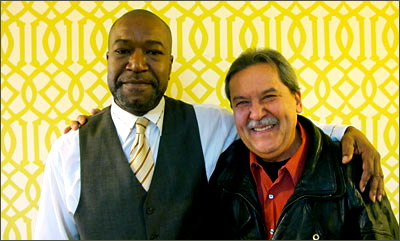
Jorge emigrated from Mexico to Minnesota in 1999. He explained that he used to have a wife, a brother, and a son. And he used to work as a food shelf coordinator for Pillsbury United Communities. Then, 2010 and 2011 came along.
In 2010, at the height of the recession, Jorge was laid off. That same year, his wife died unexpectedly. Jorge spiraled into depression. He became homeless, took to wandering the streets, and was often crying.
One day, Jorge was crying at Saint Olaf Catholic Church in downtown Minneapolis when a female parishioner approached and took him to the hospital.
A doctor diagnosed Jorge with severe clinical depression. He was prescribed medications, and he began receiving regular care at Fairview Medical Center. For a few months, he was stable again.
Then, in 2011, there were more blows. Jorge’s younger brother passed away from complications related to drug and alcohol abuse. Jorge also received news that his son, an Army soldier on his second deployment to Afghanistan, had died in combat.
Jorge stopped taking his medications consistently, and his depression symptoms returned. One day, he was again crying at Saint Olaf Catholic Church when a priest approached and took him to HCMC. There, it was determined that he was eligible for Hennepin Health.
Jorge was introduced to Lucky Ahmed, a community health worker at HCMC’s Medicine Clinic. Jorge had stopped caring about his appearance, and he recalls that the first thing Lucky did was give him a voucher to get a haircut. She also gave him a bag of food and toiletries, had him fill out a lifestyle overview, and helped him establish care at Medicine Clinic.
Once Jorge was connected to Hennepin Health’s care coordination team, his recovery began. He started to receive care from Susan Burns, L.I.C.S.W., social worker; Lisa Legrand, Ph.D., senior psychology fellow; Seth Silbert, M.D., Ph.D., staff physician ophthalmology; Karen Leaman, R.N., psychiatric clinical nurse specialist, and others. Each individual helped Jorge with various aspects of his health care.
Susan Burns, Jorge’s social worker, believes that Hennepin Health’s care coordination model—which “looks at health in a way that is not so purely medical” but also considers an individual’s behavioral health and social needs—makes all the difference.
According to Burns, addressing a social need—that of getting Jorge housed at Exodus Residence—was the intervention that improved his health the most. Prior to Exodus, Jorge was homeless and sleeping on the floor of an acquaintance’s house. The other people in the house abused drugs and alcohol. Jorge was at a critical point in his recovery and he worried that if didn’t move out, he could go down the same path as his younger brother.
Medication compliance has also been key to Jorge’s recovery. Within two weeks of taking his medication consistently, Jorge was already feeling better. Inspired to get a job, he enrolled in Learning In Style, a school in south Minneapolis that caters to adult immigrants and refugees. Here, he’s taking classes to improve his computer, English language, and writing skills. After he graduates this summer, Jorge intends to start school at the University of Minnesota.
Jorge already has a bachelor’s degree in psychology and a master’s degree in social science teaching, but both degrees are from Mexico. As a result, his teaching license is not valid in Minnesota. Recently, however, Jorge showed his transcripts to admissions counselors at the University of Minnesota. They’ve determined that if Jorge finishes his classes at Learning in Style and takes two years of coursework at the University of Minnesota, he can earn a Minnesota teaching license.
In addition to teaching, Jorge is interested in becoming a family therapist or a community health worker and working with people in recovery. He reveals that the part of his job at Pillsbury United Communities that he found most rewarding was discovering the needs of people who came in to use the food shelf and referring them to community resources that could improve their lives.
Burns isn’t surprised by Jorge’s career aspirations. Jorge’s mother was a health care provider in Mexico, she explains, and he grew up with her example of helping struggling people. Jorge, says
Burns, “has a lovely model” for how to live a life. “You don’t forget the people who guided and supported you and you use these experiences to help others.” Recently, Burns overhead Jorge talking to another patient at Medicine Clinic about food shelf opportunities in the Twin Cities.
As counterintuitive as it sounds, Jorge believes that there is an upside to struggling with medical, behavioral health, and social problems; according to him, they’re “opportunities to make a change.”
Jorge has a message to Hennepin Health: “I want to thank all of you. I feel fortunate and blessed. You changed my life.”
Article appeared in the April 2014 Hennepin Health newsletter and is available here.
